Translations 677
Argentina Says “Never Again” to Foreign Debt

Argentina Says “Never Again” to Foreign Debt
That seems to be the feeling when the government takes a defining step: restructuring the debt burden that binds it to the IMF and private creditors
Published: Saturday 01 February 2020 | 08:58:50 pm.
By Marina Menéndez Quintero
Translated and edited by Walter Lippmann for CubaNews.
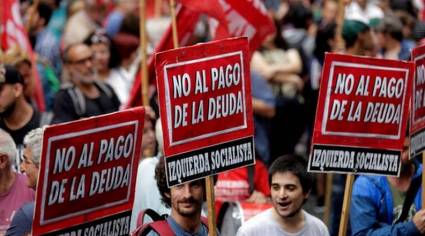 With the certainty that reason instills, the new Argentine government has already stood on its feet and is preparing to take the first and most important step of the beginning of its term, from which everything can be defined.
With the certainty that reason instills, the new Argentine government has already stood on its feet and is preparing to take the first and most important step of the beginning of its term, from which everything can be defined.
The renegotiation of the foreign debt in which Mauricio Macri’s government was trapped is essential to achieve the goals that the Frente de Todos wants to achieve in Argentina.
The urgency is understood in a simple way, and not only because the term will last only four years. It is not possible to walk around while a bundle of more than 280 billion dollars owed to private holders and the International Monetary Fund (IMF) is being dragged along. This is not only because the bundle of bills weighs too much: if each disbursement is not made within the established time frame, the country would be declared in default -that is, in cessation of payment- and then the world would indeed cut off the Argentines’ water and electricity.
The official start to get “relief” has been the first meeting of the young Minister of Economy, Martín Guzmán, with the private creditors; a meeting that took place this week at the Council of America in New York, and from which not all the businessmen came out very happy, according to certain sources that, perhaps, want to see things only from the dark side.
The headline, said the complainants, did not provide details of the “offer” to renegotiate, let alone the fiscal plan to be implemented by the Argentine government. Do businessmen have to control what the executive will do?
In any case, Guzmán had already given the details before leaving for the meeting. They are the same ones that President Alberto Fernández announced when he was still a candidate.
At that time, the president warned that, from now on, he would not borrow another dollar. And that, before paying, the first thing would be to resume growth.
At this point, it is clear that what Argentina is seeking is to “re-profile” the payment schedule, a term used to replace the familiar word “renegotiation,” and that it has different conceptual nuances because the nation does not aspire to “quitas,” that is, to a reduction in the nominal value of debts. What is sought is a restructuring -another current definition- that allows for the postponement of maturity dates.
The position is one of unquestionable technical reasoning: how to pay if the country does not produce, perhaps by asking for more debt, as Mauricio Macri did?
But Fernandez’s path, which Guzman follows, also carries with it a sense of national sovereignty that cannot be ignored if the economy and the country are to be brought to fruition.
“The economic program was designed and executed by us (…) What is ours is ours,” said Martín Guzmán before leaving for the United States, when asked about the expected negotiations with the Fund.
The security with which the holder conducts himself is not surprising. First, because it has been the international financial institution’s conditioning – in exchange for the credits granted to Macri – that has caused things to be the way they are again: unemployment triggered by state layoffs and the bankruptcy of small and medium-sized companies, a slowed-down economy, less purchasing power that made food shortages and in some cases hunger resurface, pension cuts, job insecurity, rising gas and electricity prices, and a long list of other similar things everywhere this neo-liberalism is applied in blood and fire.
Secondly, because Guzmán is not an upstart. He has worked for several years alongside the Nobel Prize winner in economics, Joseph Stiglitz, and has become an expert precisely on the issues surrounding sovereign debt.
“He is the right man at the right time (…) A brilliant and knowledgeable economist who can combine youthful vigor with experience beyond his 37 years,” Stiglitz said at the time.
On the other hand, prestigious economists who look at things from a more political angle and located in the Third World, such as the Belgian Eric Toussaint, say that Alberto Fernandez’s executive has all the arguments not to pay, because the Fund violated its own technical requirements by negotiating with Mauricio Macri the delivery of the largest credit that the institution has ever approved ($ 57 billion), even knowing that, even then, Argentina had no possibility of paying it back.
Some consider that the IMF followed Donald Trump’s instructions to support Macri; but others consider that the purpose was to tie Argentina back to the International Monetary Fund, as it was from the mid-1980s until the recovery achieved with Néstor Kirchner as of 2003, after the renegotiation of the debt at that time and the break with the dictates of the IMF. This would make the country “more manageable”.
Now some fear the interests and influence that Trump could have on the attitudes that the Monetary Fund adopts when negotiations are opened.
Many concerned people
Although it was routine, this week’s meeting in New York had nuances of urgency. The first debt repayments to the private sector are knocking on the doors, and the country’s coffers are empty.
In spite of the premiere flavor of the meeting with 50 bondholders who represented, according to what happened, 40 percent of all private creditors, there were already other meetings, especially with the IMF.
The Fund disbursed and now does not lose any footprint to the country. As soon as the primary elections (PASO) showed the possibility of a Peronist triumph in October, its officials went to sound out the ground and meet with Fernández.
More recently, the president himself spoke with the new head of the institution, the Bulgarian Kristalina Georgieva; and then the Minister of Economy who, it seems, left the interview with more satisfaction than regret, in accordance with his belief that the IMF “has changed”.
Now Martin has just met with two of its top officials, and will return to the dialogue with Georgieva in February. Both of them are protected by the good wishes of Pope Francis, because the meeting will take place during the presence of both of them in the Vatican.
What follows will not be easy. Argentina aspires to postpone the payment terms without taking away – as is required, moreover, by a loan as large as the one Macri squandered – but, according to the monitary fund manuals, to grant this postponement, the nation would have to assume commitments… And Buenos Aires insists that there will be no more recipes.
“We are not going to allow any conditionality,” said the head of Economy.
A united front
Perhaps one of the best things about the Argentine position is the unitary way in which it is forged and sustained.
Four days ago, in an unprecedented debate, the Chamber of Deputies approved almost unanimously, even with the backing of the legislators of the now-opposition Juntos por el Cambio, a bill that empowers the executive to renegotiate the debt in dollars with foreign private creditors.
It is expected to become law when the Senate debates it next week and, although the text limits the government to setting the terms of the negotiation, the strong support it received from 224 votes to two with one abstention also gives strong moral credit (and not just official authorization) for the government to act.
In any case, nothing seems to have been left “to the good Lord”. While with the private ones the executive is left free to act, it will go as a team to the negotiations with the International Monetary Fund. A team will accompany Guzmán in the preparation of the proposals for this procedure: the most difficult.
The new body is called the Unit for Technical Relations with the IMF. Its mission will be to assist the Economy Minister in the “formulation and execution of the strategy” of these links and, according to the Argentine press, the one who formulates the proposals.
There seems to be a growing consensus on the perniciousness of loans and debts, judging by the loud applause that followed the intervention of Maximo Kirchner Fernandez, head of the Frente de Todos party in the Chamber of Deputies, during the discussion of the law passed there this week.
“What we have to say here is “never again” to the foreign debt, and to start elaborating, among all of us, an economic policy that will eliminate, from now on, this kind of problem of the Argentine society”.
This is the second time in that nation that such a challenge is faced. And the bidding has just begun.
Two Months in Bolivia Without Cuban Doctors

How Does Two Months in Bolivia Without Cuban Doctors Translate?
An intense and insulting campaign against the medical collaboration that Cuba provides to the world characterized the U.S. imperial strategy implemented in 2019. It found submissive governments that preferred to leave their people without health care, in order to play along with the White House.
by Nuria Barbosa León
January 24, 2020
Translated and edited by Walter Lippmann for CubaNews.
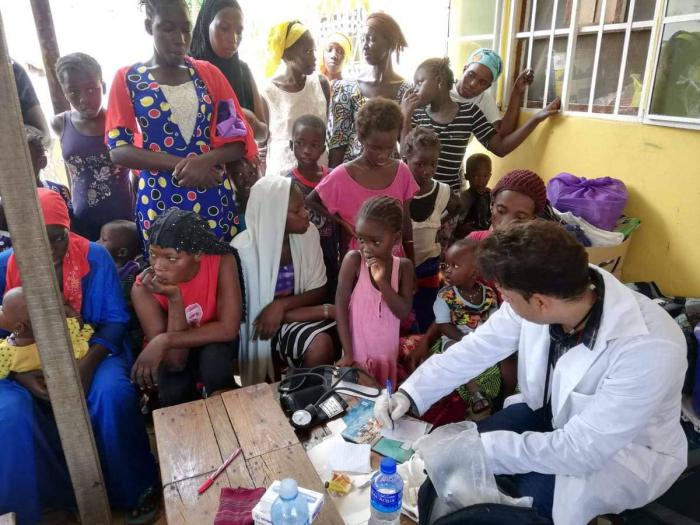
More than 160 nations have received help from Cuban doctors in 56 years of collaboration. Photo: Manuel Guillermo Wong Reme Photo: Granma
An intense and insulting campaign against the medical collaboration that Cuba provides to the world characterized the U.S. imperial strategy implemented in 2019. It found submissive governments that preferred to leave their people without health care, as long as they played along with the White House.
One example is the recent statements made by the self-proclaimed president of Bolivia, Jeanine Áñez. On January 22, at the ceremony to celebrate the founding of the Plurinational State, Áñez once again used hackneyed arguments against the altruism of Cuban health professionals.
In response to such fallacies, Cuban Foreign Minister Bruno Rodríguez, in his Twitter account, described the lies of the coup leader as vulgar. He urged her to explain to her own people that, after the return to Cuba of the collaborators, as a result of the violence to which they were subjected, more than 454,440 medical visits had been cancelled.
He also said that the two months of absence of Cuban doctors in that Andean-Amazon nation have resulted in almost a thousand women who have not received specialized assistance in their deliveries, and 5,000 surgeries, as well as more than 2,700 ophthalmological durgeries, which were not performed. “They are not just figures, they are human beings,” wrote the Head of Cuban diplomacy.
The dismantling of the programs based on Cuban medical cooperation has been financed with more than $3 million, granted by the Agency for International Development (USAID), a U.S. institution that provides funds for different aggressive actions against governments that Washington does not like.
The Cuban medical brigades in Brazil, Ecuador and Bolivia disappeared as a result of all this persecution by the United States, which questioned the professionalism and dedication of the more than 400,000 Cuban health workers who, in 56 years, have carried out missions in 164 nations.
This campaign to discredit Cuba is led by the White House National Security Council under the sponsorship of senators and congress members associated with the anti-Cuban mafia in Florida and right-wing State Department officials.
They invent the premise of a supposed “modern slavery” and “human trafficking” for Cuban doctors and hide the humanistic sense of such missions abroad. These have helped to recover health indices such as the decrease of infant mortality and maternal deaths; the curing of infectious diseases by epidemics and others.
They do not know that Cuban doctors, before leaving, receive training about the place where they will work. They sign a contract of employment with all the legal guarantees and where the terms to be fulfilled by both parties are made explicit. They take with them a medical record with the updating of their vaccines, plus the legalization of their professional titles.
Several countries even require these professionals to take knowledge tests, and medical authorities from these countries travel to Cuba to take tests in languages other than Spanish.
Those who go on medical missions do so absolutely freely and voluntarily. In Cuba, their families receive their full salary or it is kept in a bank account, while they have a stipend in the country of destination, along with other benefits (payment of accommodations, electricity, water and basic services).
The compensation Cuba receives for the cooperation it provides goes towards the financing, sustainability, and development of the public health system, which is free for one hundred percent of Cubans. This is something difficult to understand in the capitalist world, where a good part of the health services are paid for.
All the discrediting promoted by Washington is accompanied by attempts to re-establish the so-called Parole Program for Cuban Medical Professionals, which existed until January 12, 2017. This encourages desertion, payment of tickets and legal services, provision of U.S. visas and travel documents to aid workers in third countries. Its is the sabotaging bilateral agreements signed with them, depriving them of their services and depriving us of highly qualified human resources.
Today, the response to this new war has been to continue saving lives, providing health and welfare. While the governments denigrate the stories of Cuban internationalism, the beneficiaries are grateful and recognize that this achievement completely transcends geopolitical interests and any ideology.
In context
– November 2018:
Cuba decides to return home to its brigade in Brazil, because President Jair Bolsonaro questioned the dignity and professionalism of our doctors present in 3,600 municipalities in that country, which between 2013 and 2018 provided health coverage to 60 million Brazilians.
– May 2019:
The Secretary-General of the OAS presided over a conference to accuse Cuba of alleged crimes against humanity, based on Cuban medical cooperation abroad.
– June 2019:
The State Department, in its Report on Trafficking in Persons 2019, denounced Cuba’s international medical cooperation.
– July 2019:
USA The US imposes visa restriction sanctions on Cuban officials linked to medical missions.
– July 2019:
The Agency for International Development (USAID) provides three million dollars for projects against Cuban doctors abroad.
– During 2019:
U.S. Embassy and U.S. government officials went to authorities in several countries to inquire into accurate data on Cuban medical cooperation, with the aim of finding ways to eliminate it.
– October 2019:
The Government of Ecuador decides to conclude the health agreement with Cuba, alleging economic reasons, but spreading slander in the press about the participation of Cubans in the protests carried out by the Ecuadorian people.
– November 2019:
There were 26 serious incidents against our aid workers in Bolivia, and therefore the medical mission in that country was terminated.
– Throughout the year 2019:
27 bilateral legal instruments were signed in Cuba with 23 countries.
Sources: Minrex Declaration: The United States Crusade against Cuba’s International Medical Cooperation, December 5, 2019, and “Continue to promote Cuban health as a reference for the world”, Minsap report 2019.
Cuba Bets on Burley Tobacco

Cuba Bets on Cultivation of Burley Tobacco
“National demand is low and has been covered over the years. But exports in the form of raw materials offer us many possibilities,” said Félix Ramón Fernández, director of the pre-industrial division of the Tabacuba business group.
by Ronald Suárez Rivas | ronald@granma.cu
January 30, 2020 20:01:27
Translated and edited by Walter Lippmann for CubaNews.
PINAR DEL RÍO: With the purpose of increasing exports, and attending a demand that today is not in conditions to cover, Cuba increases the plantating of burley tobacco.
During the current season, the plan is to reach some 1,700 hectares, distributed between the municipalities of Consolación del Sur and Pinar del Río, but the program to develop this crop aims to grow much more.
Félix Ramón Fernández, director of the pre-industry department of the Tabacuba business group, explains that there is currently confirmed demand from foreign customers for 5 000 tons. However, the country’s production will only be able to reach around 2,000 this year.
This is why increasing burley cultivation is one of the sector’s priorities.
Although currently only pineapple fertile lands are harvested, the official says that it will also be taken to other territories in the center of the country, in order to raise production to 10 000 tonnes.
However, the main focus will be on Vueltabajo, where it has already begun to replace dark tobacco in some of the Consolación del Sur and Pinar del Río plantations.
Fernández points out that burley production was very depressed, and was aimed solely at the Cuban industry.
“National demand is low and has been covered all these years. But export in the form of raw materials offers us many possibilities.
Justo Luis Fuentes, president of Tabacuba, assures that “this type of tobacco is very coveted in the world today. Therefore, the increase of its production constitutes a fundamental line of work, for the increase of exports.
“Cuban dark tobacco is also in great demand, but we have a greater quantity of that,” he adds.
Introduced into the country in 1947, in the area of Herradura (municipality of Consolación del Sur), burley is a type of blond tobacco that is mainly used in cigarette blends, due to its ability to retain aromas.
Cuba: 200 Cases of Leprosy Every Year

Cuba reports around 200 cases of leprosy every year, a disease that is well supervised and controlled on an outpatient basis
Many of the affected patients experience some form of discrimination and exclusion and therefore face mental health problems, such as depression or anxiety.
by Web Editor
January 29, 2020
Translated and edited by Walter Lippmann for CubaNews.
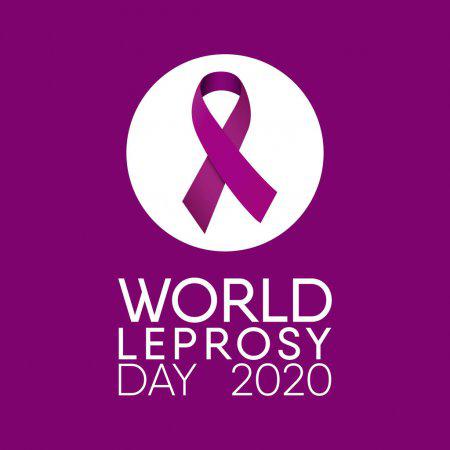
Many erroneous beliefs are related to leprosy, but specialists in the field prefer to point out three truths about it:. It is curable, it is not contagious because it ceases to be transmissible beginning with the first doses of treatment and it does not produce deformities or disability if it is diagnosed in time.
World Leprosy Day is observed on the last Sunday of January, this time on the 26th. Dr. Raisa Rumbaut Castillo, head of the National Leprosy Program of the Ministry of Public Health, explained that every year in Cuba an average of 200 new cases of both sexes are reported, from all provinces, mainly Granma, Santiago de Cuba, Camagüey, Ciego de Ávila and Havana, the latter because of the number of migrants it receives.
Many of the affected patients experience some kind of discrimination and exclusion and therefore face mental health problems, such as depression or anxiety. In view of this, this year’s theme will be: Stigma and human rights of people affected by leprosy.
The doctor stressed that unlike other countries where treatment is only supervised in the first dose, in Cuba leprosy patients receive free, supervised and controlled care (on an outpatient basis) in primary health care, that is, through the Family Doctor and Nurse Program. Patients are no longer isolated in sanatoriums (formerly called leprosaria).
The also First Degree specialist in Epidemiology and Master in Infectious Diseases said that this treatment is donated by the World Health Organization (WHO), which recently decreed that every January 30 (and from this year) will be commemorated the World Day for Neglected Tropical Diseases (WTD), which includes leprosy.
Apart from the fact that there is no neglected disease here, both dates will be remembered on 30 and 31 January with a national scientific day to be held in the capital, at the Comandante Manuel Fajardo University Clinical Surgical Hospital, which will be supported by the Cuban Dermatology Society.
Leprosy is a chronic disease that affects the peripheral nerves and the skin, but has no defined symptoms. This is why specialists call it a “great simulator”.
However, the most common symptoms are light patches of skin (brown and red), which may or may not have sensitivity disorders. That is to say, difficulties in differentiating the cold temperature from the hot one in the affected areas, as well as the loss of the sensation of pain.
The risk of contagion is very low and the incubation period, on average, is five years, but it can be as long as two years and as long as 20 years. The bacillus penetrates through the skin or the mucous membranes of the body and evolves slowly, progressively affecting the nervous system and the skin. This means that close and repeated contact with an untreated patient is required.
The first news of the disease in Cuba is dated January 17, 1613 and corresponds to the act of the Cabildo, when a group of neighbors from Havana, reported that “there are 4 or 6 people touched by the San Lazaro disease that have come from outside”. This document, of importance for the Medical History of Cuba, indicates the beginning of the leprosy endemic.
Every year, according to WHO data, around 200,000 new cases are diagnosed in the world, with India (more than 120,000 cases), Brazil (more than 28,000 cases) and Indonesia (more than 18,000 cases) being the nations with the greatest number of reports of the disease.
For years this organization has proposed to eliminate this disease. The goal was for each nation to achieve a prevalence rate of less than 1 case per 10,000 inhabitants. Cuba has been meeting this goal since 1993, and is now in the post-elimination phase.
“Behind a leprosy patient, there is always the one who infected them. That is why the most important thing is to interrupt transmission,” said the doctor.ef
Lung Cancer: Cuba’s Leading Cause of Death

Lung Cancer: Cuba’s Leading Cause of Death
As of February 4, World Cancer Day, until March 21, when a national race will be held in favor of this struggle. The World Day against Cancer will take place in Cuba to encourage self-care and self-responsibility.
By Ana María Domínguez Cruz anamaria@juventudrebelde.cu
Published: Thursday 30 January 2020 | 12:39:43 pm.
Translated and edited by Walter Lippmann for CubaNews.
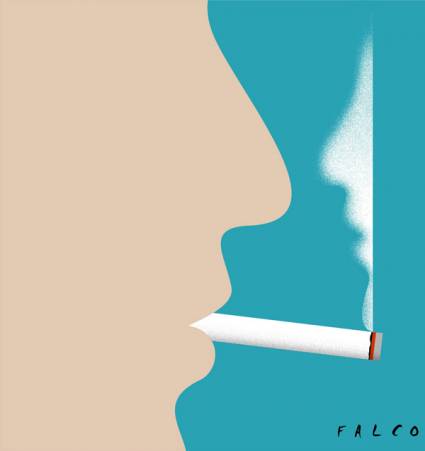
Two out of ten deaths worldwide are caused by tobacco. Author: Falco Published: 21/09/2017 | 05:49 pm
Lung cancer is the leading cause of death in Cuba for women and men, according to recent statistics registered by the Ministry of Public Health (Minsap). This shows the need to be aware, first of all, of the increase in dependence on smoking, the main risk factor for this disease.
This reflection was shared by Dr. Maria Caridad Rubio Hernandez, head of the Independent Section for the control of cancer in Minsap, who warned that the age of initiation in this habit is increasingly younger and the number of women has increased in recent years.
It is important to work on raising public awareness of this type of cancer, because, although we have the Cuban vaccine against lung cancer (CIMAvax-EGF), thanks to the work of scientists at the Center for Molecular Immunology, it is for a specific treatment, not for all types of lung cancer. It is vital to respect the non-smoking areas in public establishments and to address the impact of second-hand smoke, among other actions.
The oncology specialist revealed that in 2019, 48,617 new cases were recorded, and 24,912 people died during that period, with the provinces of Artemisa, Mayabeque, Las Tunas, Granma and Santiago de Cuba recording the highest number of deaths from this type of disease.
We aspire to position cancer as a chronic controlled disease, the official stressed, but to do so we need the responsible behavior of the population and intense educational work.
“Unfortunately, there are non-modifiable risk factors for cancer, such as age and heredity, but self-care and self-responsibility are essential for early diagnosis and timely treatment. This is the case, for example, with breast and cervical cancer, for which the female population does not always understand the urgency of learning to perform breast self-examination or the need to go for cytological testing.
Access to cancer diagnosis and treatment is organized based on the strategy developed by Minsap at the national level, said Rubio,. He mentioned 42 medical oncology services in all the country’s hospitals, the two third-level institutions such as the National Oncology Institute and the Hermanos Ameijeiras Hospital. In addition, there’s the upcoming incorporation of Cimeq for comprehensive cancer diagnosis, 25 nuclear medicine services, nine radiotherapy services and nine oncopediatrics services as the main access routes.
“Cancer is one of the priorities of our health system and cases of pediatric cancer are becoming more relevant and urgent in the care system. As a result, central nervous system tumors, leukemias and lymphomas being found more frequently in infants.
Rubio pointed out that, in the midst of the hostile context that conditions the blockade imposed on the country, Cuba consolidates the introduction of new technologies for the diagnosis and treatment of this pathology, whose cost is very high.
“Increasingly, personalized medicine is being advocated, which makes care processes more expensive, but it is part of the interest of out health system to maintain a high life expectancy in our population, and with quality”.
Kobe Bryant Rises to Eternity

Kobe Bryant Rises to Eternity
Kobe Bryant’s tragic death in a helicopter crash along with eight others – including Gianna, one of his four daughters – leaves immense pain, even for those who are not sports fans
——————————————————————————
Translated and edited by Walter Lippmann for CubaNews.
Author: Yosel E. Martínez Castellanos | yosel@granma.cu
January 27, 2020 23:01:53

Kobe Bryant junto a su hija Gianna. Photo: AP
Basketball player Kobe Bryant is gone and leaves an immense pain, even in those who are not sports lovers. His tragic death, in a helicopter crash with eight others – including Gianna, one of his four daughters – on Sunday outside the city of Los Angeles, has been the news of the world for the last 48 hours.
The American shooting guard was a worthy heir to the legacy sown by Michael Jordan, considered the best player in the sport’s history. Kobe won everything: two Olympic gold medals, five NBA championship rings, two laurels for the most valuable player in the finals of that prestigious league and an award for the most outstanding basketball player, are several of the prizes he won, all with the Los Angeles Lakers club.
But Kobe made a name for himself beyond sports, for conveying values of justice and helping those who have needed it most financially. The “Black Mamba”, as he was known, was and will be an example to follow.
His departure has been commented on by personalities from the sports, political, social and cultural worlds, who through social networks dedicated countless words of praise to him.
Among the comments expressed by the personalities stand out the words professionalism, respect and love he felt towards the game.
Besides being described as an excellent man, capable of encouraging others not to give up their dreams and see their objectives fulfilled.
A natural competitor, as he was, was not defeated by death. He was victorious by winning millions of hearts.
Online Discussion of Sexual Fantasies

Online Discussion of Sexual Fantasies
Have you ever wondered if your sexual fantasies and practices are common or can be considered dysfunctional? Participate in this discussion with the section Sexo Sentido, which on the occasion of its twenty years has prepared many initiatives. Come and see.
 By Mileyda Menéndez Dávila
By Mileyda Menéndez Dávila
A CubaNews translation.
Edited by Walter Lippmann.
Have you ever wondered if your sexual fantasies and practices are common or can be considered dysfunctional? How can you satisfy them without harming your health or committing crimes? Next Thursday, January 30th you can ask several specialists from Cenesex about this subject, who will visit JR’s digital newsroom for an online interview. You can also forward your questions to digital@juventudrebelde

MAS candidate’s hearing suspended

Bolivia
MAS candidate’s hearing suspended
due to procedural irregularities
Luis Arce declared that the irregularities of the process are a sign that he is a victim of political persecution with the aim of undermining his race for the presidency of the Republic, a position for which he is considered a favorite.
By Prensa Latina
Translated and edited by Walter Lippmann for CubaNews.
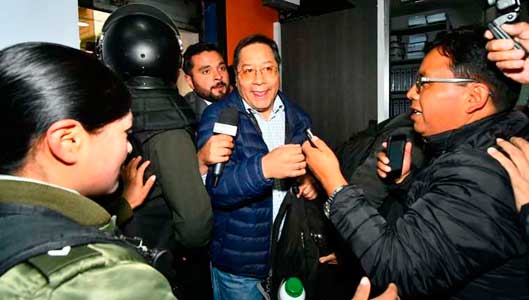
prensa-latina.cu
La Paz, Jan 29 (Prensa Latina) Bolivian presidential candidate for the Movement Towards Socialism (MAS), Luis Arce, explained that a hearing against him set by the coup government was suspended today due to irregularities.
This morning, Arce went to the Public Prosecutor’s Office in this capital to comply with the summons, but the hearing was canceled due to the defense’s claim that the prosecutor’s signature was missing from the summons and that he did not know the details of the process.
For the above-mentioned reasons, recognized by the prosecutor Heydi Gil, the Prosecutor’s Office decided to suspend the hearing and set a new date, still unknown.
Upon his departure from the Justice building, Arce declared that the irregularities of the process are a sign that he is a victim of political persecution. Its the objective is the undermining of his race for the presidency of the Republic, a position for which he is considered a favorite.
I am a transparent man, I came to testify because I have nothing to hide, I am not corrupt, I am not a thief. My team of lawyers and the prosecutor herself noticed the procedural flaws in the notification of my person. This is eminently political against our MAS candidacy, declared Arce.
Former Minister of Economy and Finance during almost all of Evo Morales’ governments, Arce also warned that in order to reduce his chances of winning at the polls, he does not rule out the appearance of new legal cases.
The things that will get us out, is that the people will judge the way they proceed, arbitrarily, against a candidacy that they know has popular support, because we are absolutely innocent of anything they want to tell us, said the MAS candidate.
General elections in Bolivia are scheduled for May 3, and according to recent polls, the MAS duo of Arce and former Foreign Minister David Choquehuanca (for vice president) is the favorite.
Denunciations of political persecution of activists and leaders of this political movement and related organizations have been reiterated since the coup d’état that forced President Evo Morales to resign from office on November 10.
Chronicle of Harassment Announced

Chronicle of Harassment Announced
 By Dixie Edith
By Dixie Edith
Cuban journalist and professor at the Faculty of Communication of the University of Havana.
On Twitter @Dixiedith
January 16, 2020
Translated and edited by Walter Lippmann for CubaNews.
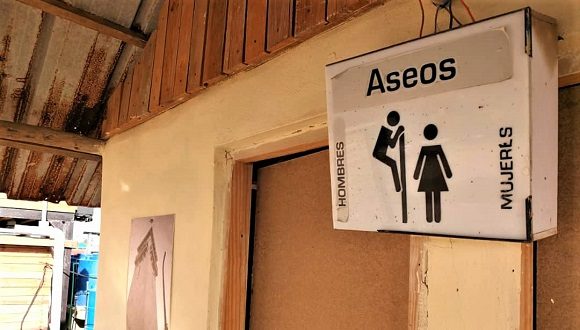
The pictograms indicate a public bath located in the new recreational space at the intersection of 1st and 70th streets, in the capital city of Playa. Photo: Ariel Terrero.
From a bad joke to sexism is only one step removed. Evidence abounds; it is enough to review, even as the crow flies, various communication spaces, in any format. But what happens when the dubious attempt of a joke, as if that were not enough, makes a crime acceptable?
The question is neither banal nor exaggerated. A few days ago, a group of students from the Communications Department at the University of Havana, had just finished their semester of studies on gender. They were debating via WhatsApp about the photo that accompanies this text. “But what is this?”, some asked. “Doesn’t anyone realize this nonsense?”, asked others.
The photo captured the pictograms that point to a public bathroom located in the new recreational space of the capital’s coast, at the intersection of 1st and 70th streets, in Playa municipality. The figures show a man sneaking a look at a woman, above what looks like the wall that divides the two stalls. And here, the frustrated attempt at a “joke” came and went.
We are no longer talking about old hats: top hats for them and full of flowers or lace for them; or stereotypical film characters showing the gallant and the maiden, the flamenca and the bullfighter. Not even of those other attempts at “creativity” that appeal to phallic symbols, heels or ties, or any other topic tinged with sexism, by the work and grace of the macho tradition that pursues us.
Now we are also witnessing incitement to an act that is punishable under our laws. And, as if this were not enough, it not only positions women once again as the subject – the “natural” victim – of hegemonic masculinity, but also places all men in the position of violators of the law, of victimizers. This is called symbolic violence.
In the opinion of Yamila González Ferrer, a lawyer and expert on gender and family issues, “when what this image is showing occurs, we are dealing with a crime of harassment, provided for in Article 303 of the Criminal Code, which refers to sexual outrage”. But, for her, the most serious thing in this particular case is that “this type of symbolism is used in a public place”.
The aforementioned Article 303 has three subparagraphs, which propose sanctions of up to “three months’ imprisonment” or a “fine of one hundred to three hundred pesos“ for those who harass other persons “with sexual requirements”; offend “modesty or good manners with obscene exhibitions or acts”, or produces or puts into circulation “publications, recordings, cinematographic or magnetic tapes, recordings, photographs or other objects that are obscene, tending to pervert or degrade customs”.
If I were to make a dynamic or evolving interpretation of the law,” says Yamila, “then subparagraph c of that offense of sexual abuse could be applied perfectly well to that case.
Another lawyer, Dr. Arlín Pérez Duarte, agrees with her, in this case an experienced criminal lawyer. In her opinion, this last section applies in this case from what she calls an “analogical interpretation” of the law, since it “appeals to the effects provoked”. The specialist says that, in this matter, “from the point of view of rights, there is a lot of room for improvement”.
For example, criminal implications could be sought from so-called voyeurism or, or as we say jokingly, peeping, which in the eyes of the law is considered a form of outrage or a crime against honor. Although traditionally this type of infraction in Cuba is not punished as a crime, but more as a contravention,. However, in the opinion of the penalist, in this case “it has a greater scope, since it is in an institution that provides a public service”. In other words, it goes beyond affecting an individual person.
The world of signage to label the doors of public toilets and bathrooms serves as a preview of what we will find inside. But it is an soup where multiple proposals are cooked. There are designs that move, between the thorny waters of good and bad taste, the vulgar and really creative. In this unfortunate case, to put more spice to the broth, the half-assed sign also violates Article 40 of the recently approved Constitution of the Republic, which defends human dignity; Article 43, which condemns gender violence in all its forms and Article 48, which defends the right to privacy. And we could continue looking.
Currently, many public discussions around the world are occupied with how to achieve more inclusive signage and urban spaces that do not reproduce those stereotypes that our patriarchal societies have imposed on women and men. There is talk, for example, of unisex toilets, which serve them equally, which would also help not to humiliate or discriminate against other people who have different sexual orientations and gender identities.
If we still find signs like the one in the above mentioned photo, it is clear that we are still far from those other controversies. The unfortunate thing is that the case is not unique. The same students who questioned and argued about the 1st and 70th signs also claimed to have seen similar pictograms in other establishments, especially in the self-employed sector.
As with advertising, urban design, intentionally or not, helps to perpetuate ideas through graphic codes and creative nods. And because machismo is so naturalized in our lives, we often find it hard to identify that behind those seemingly innocent jokes is a deeply violent, threatening message that, according to García Márquez, could become the advertised chronicle of a crime of harassment.
Lawfare on the Bench

Lawfare on the Bench
A non-binding investigation could show the dirty methods that certain judicial systems use to engage in politics… also very dirty
By Marina Menéndez Quintero
January 25, 2020
Translated and edited by Walter Lippmann for CubaNews.

lawfare Author: Taken from the Internet Published: 25/01/2020 | 07:38 pm
Chilling tales of lies, slander and unjust prison sentences could come to the fore, totally naked, if nothing blocks the work of the judges who make up an unusual court: the Ethics Tribunal which has set out to investigate – and ventilate! – the most notorious cases of lawfare.
Perhaps because the court is presided over by an Argentine constitutionalist magistrate – the prestigious and experienced Eduardo Barsesat – or because the news has had wide repercussions in his country, the media has pointed out that the entity is a creation of “sectors close to Kirchnerism” .
However, Barsesat explained that the idea had been around for two years and, in fact, it was conceived in Madrid, not in Buenos Aires. It was in the Spanish capital that the foundation of the court was first announced last November, and the city in which its ruling will also be announced exactly one year later, next November.
According to the magistrate’s statement to the alternative media El Destape Radio, this is “a joint initiative of the Lawfare Institute of Sao Paulo, which includes Lula’s defense lawyers, and the Common Action Forum of African countries.
The lawyer – who has participated as a prosecutor and judge, respectively, in two other ethical judicial processes (the one that was developed to establish the responsibilities of the Argentine military dictatorship and the one that analyzed crimes for economic, social and cultural crimes) – is concerned that lawfare “is not foreseen in any international doctrine” and constitutes, he says, “a perverse practice that generates the civil death” of those who are its victims.
“Many believe that the processes that disqualified Lula from being a presidential candidate or that they used here to persecute Cristina (Fernández) or to outlaw (Rafael) Correa, are normal processes; and we want to demonstrate that they are irregular,” he explained to other media.
“It’s a judicial persecution in which nobody is very sure of what their rights are,” he said in one of the many interviews he has given in recent days, while denouncing the digital publication Perfil: “Lawfare, or judicial warfare, which would be its meaning in Spanish, is a practice of persecution and destruction of political opponents or enemies, using judicial processes as a weapon.
In accordance with the announcement, the Ethics Tribunal that has just been set up will issue summonses and collect testimonies and documents, interview detainees and then issue an ethical judgement.
Barsesat is not too concerned that such a ruling will not lead to effective penalties.
In an article close to a declaration of principles about the functioning of the court and signed by the jurist himself in El Destape, Barsesat recognizes that, in the face of what he calls “a new modality of the former doctrine of “national security” – and which operates, fundamentally, by implementing the rotten leg of the administration of justice – it is difficult to expect a trial of lawfare before the same judges who are its executors and ideological supporters.
“Nor are there any jurisdictional bodies, regional or international, that can operate with training and authority to disrupt the lawfare,” he adds.
However, it also takes into account that there is a need to “make people aware of the irregularity and anti-juridicality of this phenomenon, while advancing in “the task of making people aware of this new instrument of social domination, and opening up paths for future challenges before judicial bodies, national, regional and international.
These political crimes will not be the only ones to be tried, as they could be considered.
What Barsesat calls “a new undertaking of that juridical consciousness of humanity that comes from a resolution of the CAF (the Common Action Forum), to constitute the Common Action Tribunal (the name of this very special court)”. It also intends to prosecute the practice that he identifies as whistleblowing: “the persecution as informants, of those who make public data described as secret by the hegemonic powers,” he explains.
And one wonders if it would be possible, then, to also analyze the persecution that keeps the Australian journalist Julian Assange virtually under kidnapping. Unfortunately, many in the world seem to have forgotten the effectiveness of the leaks that published, in black and white, the hairs and signs of the warlike execution of W. Bush. This was thanks to the audacity of his web site Wikileaks. The same could be said of then Sergeant Bradley Manning (Chelsea Manning).
Big Game Hunting
There is reason to wonder whether the penetrated judicial systems that have put this practice into effect will allow the court headed by Barsesat and composed of also experienced jurists from other nations to proceed, when they require files, or the “evidence” that in many cases does not exist?
But the truth is that his appearance could not be more fair and timely.
A look at recent events in Latin America – just to look at this part of the world – and even a glance at the events that are taking place right now, allows us to see how recurrent the use of “the judicial war”, or “the judicialization of politics”, as it is more commonly known, is to stone not only progressive or frankly leftist political leaders. It is also being used to demonize movements and parties, to twist the destinies of some countries and, of course, to criminalize political processes.
The case of Luiz Inácio Lula da Silva, who was confined in an improvised prison at the police headquarters in Curitiba for a year and a half after a trial that was rushed to a close when the resources of the defense had not yet been exhausted, and against whom some six legal cases are still open on unproven charges, so that his freedom is still not definitive, is the most notorious.
He was succeeded by his fellow worker and co-religionist of the Workers’ Party, Dilma Rousseff, the first piece of work to be broken in Brazil by means of treason, distortion and lies, in an impeachment that anticipated the political play in gestation.
Also victims of lawfare are former Ecuadorian Vice President Jorge Glas, locked up and then transferred to an inhospitable maximum security prison for acts that were not sufficiently proven and considered corrupt. Also, former President Rafael Correa himself, prevented from returning to Ecuador by the arrest warrants circulated to Interpol against him,. These are also on the basis of unproven accusations that have ranged from an alleged attempt to kidnap a congressman to the presumption that he was organizing a coup d’état. It’s a fantasy!
But the judicial persecution has also been hung on less prominent figures such as former ministers or ex-officials of the Argentine governments of “the Kirchners”. It is still hanging over Vice President Cristina Fernandez, accused of several alleged acts of corruption, and the first voice to denounce lawfare as a way of judicializing politics.
In any case, if anyone doubts the artful and opportunistic way in which this is being employed, they need only look at Bolivia. Evo Morales, who left the country after being threatened by the military to prevent the coup d’état from ending in a massive bloodbath, has now been accused by the coup leaders of “terrorism” and “sedition”.
And less than 24 hours after his name was included on the Movement Toward Socialism (MAS) ballot for the announced presidential elections in May, former minister Luis Arce has just been included among those accused of alleged embezzlement from the Indigenous Fund. Here is another way to prevent the MAS from regaining the presidency!
However, such examples are not the only ones that are outrageous. Glenn Greenwald, the U.S. journalist who runs the website The Intercept in Brazil. He published, along with two other colleagues, the audios that prove how the trial against Lula, in the midst of Operation Lava Jato, was “fabricated”. They followed the instructions of the prosecutor-turned-Justice Minister Sergio Moro, another one being pursued by “justice”, which accuses him of committing computer piracy and cyber-crimes.
Dr. Bersesat is right when he explains that lawfare is based, among other things, on fictional stories. What is not fiction at all is its extermination character, as could only happen to the minds that are credited with its creation in 2001 as part of the U.S. military’s doctrines of domination and unconventional methods.
TRANSLATOR’S NOTE:
Lawfare is a form of war consisting of the use of the legal system against an enemy, such as by damaging or delegitimizing them, tying up their time or winning a public relations victory.[1][2] The term is a portmanteau of the words law and warfare.
https://en.wikipedia.org/wiki/Lawfare
Subscribe to Blog via Email
| M | T | W | T | F | S | S |
|---|---|---|---|---|---|---|
| 1 | ||||||
| 2 | 3 | 4 | 5 | 6 | 7 | 8 |
| 9 | 10 | 11 | 12 | 13 | 14 | 15 |
| 16 | 17 | 18 | 19 | 20 | 21 | 22 |
| 23 | 24 | 25 | 26 | 27 | 28 | |

You must be logged in to post a comment.